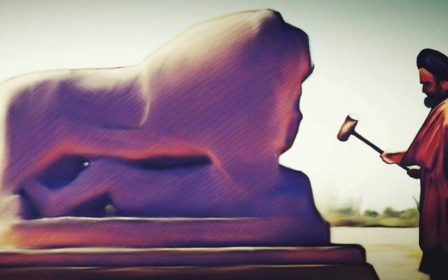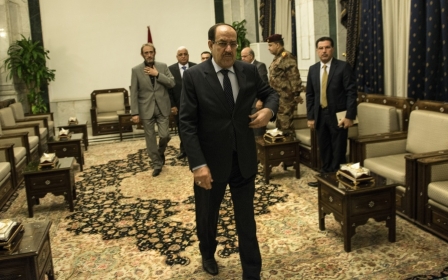Maliki lauds Iran's role in anti-IS fight, says Sunni leaders support terrorism

Former Iraqi prime minister Nouri al-Maliki defended Iran's role in the battle against the Islamic State (IS) group, while accusing Iraq's Sunni political leaders of siding with "terrorists" and dismissing anti-corruption protests as attempts to seize power.
In a wide-ranging interview with Iranian news channel al-Alam on Tuesday, Maliki said those calling for Iraqi government reforms and opposing corruption in recent months were exploiting their slogans in order to paralyse parliament and seize power for themselves.
He also charged his political opponents with mobilising people in the streets “who do not realise the danger of infringing on the integrity of the state and public order".
After repeated protests held in Baghdad and other parts of the country over political corruption, thousands of supporters of Shia cleric Muqtada al-Sadr broke into the capital's Green Zone in May as frustration over both nepotism and political deadlock exploded.
In Tuesday's interview, Maliki criticised the rival Sadrist political movement and accused them of attempting to take over the nation's politics: “Calls for reform that some expressed through demonstrations and actions are robbery in order to control the political process and direct it however these political entities wish.”
Maliki, who is still secretary-general of the Islamic Dawa party, governed Iraq between 2006 and 2014. Despite winning the highest share of the vote in 2014, he was blocked from a third term by political rivals and Shia clergymen after many Iraqis blamed him for the spectacular loss of almost a third of Iraqi territory to IS.
Haider al-Abadi, Maliki's political party mate, in cooperation with Maliki's Shia, Sunni and Kurd rivals and supported by the US, succeeded him in the top office.
Maliki was appointed vice president, but an embattled Abadi, in response to massive demonstrations, abolished Maliki's post last August as part of his first package of reforms. Since then, tension between Maliki and his rivals has been high.
Mutual confidence
On Tuesday, Maliki said that Iraq’s Sunnis were brothers and partners and that there could be no peace without them, or the Kurds for that matter. He called for increased trust on all sides because of a lack of mutual confidence that was “eating away at the body” of Iraqi national unity.
But he dismissed claims Sunnis had been marginalised, and instead accused Sunni political leaders of supporting "terrorism".
“Talk about marginalisation of Sunnis is rhetoric,” he said, adding that “political and regional forces that oppose the new Iraq use it as a hook on which to hang their ideas, attitudes, desires and struggles".
He then accused former Sunni government ministers of supporting terrorists, saying: “These people supported the government by day and by night they are part of terrorist organisations. This is what happened, and this is not marginalisation.”
Having accused leading Sunnis of conspiring with militants, he then praised the controversial Popular Mobilisation Units (PMUs) - often referred to as Shia militias, but also featuring non-Shia fighters - many of which stand accused of widespread sectarian atrocities against Sunnis.
The former Iraqi premier described them as “essential” for helping liberate swathes of Iraq from IS control. Owing to their valuable combat experience, he said, they should be transformed from militias into a national security-military institution.
Such an institution, he said, would not replace the national army, but would “address situations like the one Iraq currently finds itself in".
Maliki, who has previously made sectarian outbursts, continued in a similar vein with regard to foreign affairs.
No one, he said, had stood with Iraq as Iran had in terms of both money and blood. Despite close coordination between the two countries, Maliki said that Iran was not interfering with internal Iraqi affairs.
The former Iraqi premier also attacked Saudi Arabia's religious establishment, accusing it of creating space for sectarianism and fomenting terrorism by opening institutions that spread extremist thought. All of these factors then led, he said, to the development of militant groups.
Maliki also said that the Kurds did not have a right to call for independence and separate from the rest of Iraq, and that independence would adversely affect the Kurdish region, and in turn, Baghdad, as well as spreading to the wider Middle East.
He called the prospect of Iraq’s partition an “absolute evil”.
Stay informed with MEE's newsletters
Sign up to get the latest alerts, insights and analysis, starting with Turkey Unpacked
Middle East Eye delivers independent and unrivalled coverage and analysis of the Middle East, North Africa and beyond. To learn more about republishing this content and the associated fees, please fill out this form. More about MEE can be found here.




